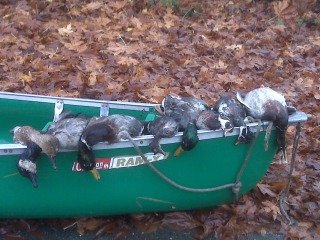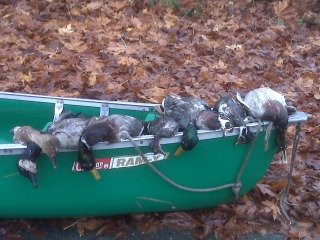 There is a Winchester painting of a trapper in a canoe coming around a corner through the rapids, and directly in his path is a huge bull moose. His trusty Winchester is in one hand in an active movement. There’s nowhere to go and something thrilling is about to happen. I have developed my pace over the years to try and match the pace of the deer woods: slow, attentive, patient, persistent. Floating in a river is different. The pace is set entirely by the river, the flow of nature itself.
There is a Winchester painting of a trapper in a canoe coming around a corner through the rapids, and directly in his path is a huge bull moose. His trusty Winchester is in one hand in an active movement. There’s nowhere to go and something thrilling is about to happen. I have developed my pace over the years to try and match the pace of the deer woods: slow, attentive, patient, persistent. Floating in a river is different. The pace is set entirely by the river, the flow of nature itself.
No stalk has ever been quieter than floating with the current, no tension as acute as wondering if there will be green heads flushing or a new log threatening as the current takes you swiftly around the next corner. In the course of the river you will find both. How you react will determine not only if it will be baked wood duck with raspberry sauce, or if your boat, partner, and shotgun will be at risk. The place for learning canoe skills is in a spring trout lake or a summer river. Pushing off in the early dawn in December with six miles to the downstream pickup involves a feeling of commitment it’s exciting, it has great potential, and there is enough risk involved to take it seriously. When you push into the current, “adventure” is the only word to describe what you have started.
The payoffs for even a moderately skilled wing shooter can be impressive. While shooting out of a canoe is challenging, most shots are close flushes at multiple birds. It isn’t uncommon to ease around a corner and flush flocks of mallards within rock throwing range. This makes doubles and triples quite possible. The challenge comes when floating downstream and ducks are flying up, or worse, down the river over you. Ducks flying downriver come with almost no warning and are usually gone before you can lift your weapon. Ducks flying upstream often come into view just out of range, but don’t have time to get out of the creek bed before you can shoot. This leaves you a quick chance to mount your gun and shoot before they pass you.
I have been saved on a couple of occasions by remembering that it isn’t much harder to shoot with your off hand. It doesn’t naturally cross your mind but all hunters should at least try shooting left (or right) handed at the range. Sooner or later it will pay off in the field.
The fringe benefits of float hunting include other wildlife sightings. In the right place canoe hunting can be an excellent bet for deer hunting or access to deer hunting away from the crowds. We have floated within feet of unsuspecting beaver, otter, mink, bucks, does, bobcat, coons and farmers. When you set off on a float trip you should try to leave all expectations. The adventure is never knowing how it will unfold. Luckily in all my trips, the canoe has stayed upright and the hunters have managed to outscore the ducks as far as splashing into the water goes.
Float hunting is an adventure with an element of risk and a probability of reward. It provides a cross section of the land, viewed at the pace of the river. It’s an opportunity to see and experience the outdoors and hunting in a different way. I love the cupped wings and early morning plans of decoying ducks as much, maybe more, than the next hunter. But when conditions are right, for a few hunts each year, you may see my truck parked where the highway crosses the river.








